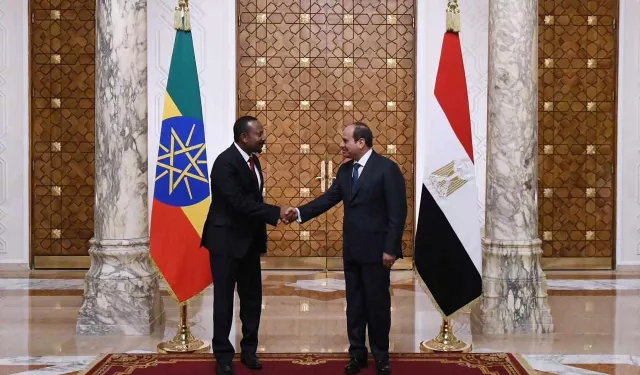President Abdel Fattah El-Sisi on Sunday warned that Egypt “will not stand idly by” in the face of Ethiopia’s unilateral and irresponsible management of the Nile River, pledging to take all necessary measures to protect Egypt’s water security and national interests.
The warning follows Ethiopia’s formal inauguration last month of the Grand Ethiopian Renaissance Dam/GERD on the Blue Nile without reaching a legally binding agreement with Egypt or Sudan on the dam’s filling and operation. In response, Cairo submitted a formal letter to the President of the UN Security Council describing the completion of GERD’s filling as a clear violation of international law.
In a pre-recorded address at the opening of the 8th Cairo Water Week, held under the theme “Innovative Solutions for Climate Resilience and Water Sustainability,” El-Sisi condemned “any unilateral measures on the Nile River” that ignore international agreements, destabilize the region, and threaten the shared interests of Nile Basin states.
El-Sisi reaffirmed Egypt’s conviction that international rivers are lifelines, not borders—shared resources meant to foster cooperation and integration, not conflict and dominance.
He emphasized that water security and sustainable development are inalienable rights that must be protected through fair partnerships grounded in international law and the principle of no harm.
“Over the course of 14 years of arduous negotiations with the Ethiopian side [...] Egypt has presented numerous sound technical alternatives that meet Ethiopia’s stated goals and safeguard the interests of the two downstream countries,” El-Sisi said. “However, these efforts have been met with intransigence that can only be explained by a lack of political will, and seeking to impose a fait accompli.”
He added that Ethiopia’s posture is driven not by development, but by a narrow political agenda and false claims of exclusive sovereignty over the Nile. “The established truth is that the Nile is the shared resource of all its riparian states and a collective resource that cannot be monopolized,” he said.
Citing recent flooding in Sudan and the submergence of over 1,260 feddans of farmland in Egypt’s Menoufiya and Beheira governorates, El-Sisi blamed Ethiopia’s chaotic water releases for the damage. “In the past few days, Ethiopia, through its undisciplined management of the dam, has caused damage to the two downstream countries,” he said in his statement.
Releases were made without warning or coordination, he added, calling on the international community, and African nations in particular, to confront these actions and ensure water discharges from the dam are properly regulated during both flood and drought seasons.
El-Sisi warned that Egypt is already one of the most water-scarce countries in the world. Rainfall averages only 1.3 billion cubic meters annually, and per capita water availability has fallen to 500 cubic meters per year—half the global water poverty threshold.
He stressed that over 98% of Egypt’s water comes from the Nile, which originates outside its borders, and that water is an “existential issue” for over 100 million Egyptians.
In December 2023, Egypt announced the collapse of negotiations, with the Ministry of Water Resources and Irrigation stating that it would closely monitor all filling and operating procedures. Egypt would reserve its right under international treaties to protect its water and national security.
In October 2024, El-Sisi had reiterated that preserving the Nile is a matter of existence, not choice. And in March 2024, Egypt’s Minister of Irrigation admitted that the dam had already harmed Egypt, but said the state had managed the damage “at a cost.” He stressed that under the Declaration of Principles, any damage caused by the GERD must be compensated—and Egypt will demand that compensation.
